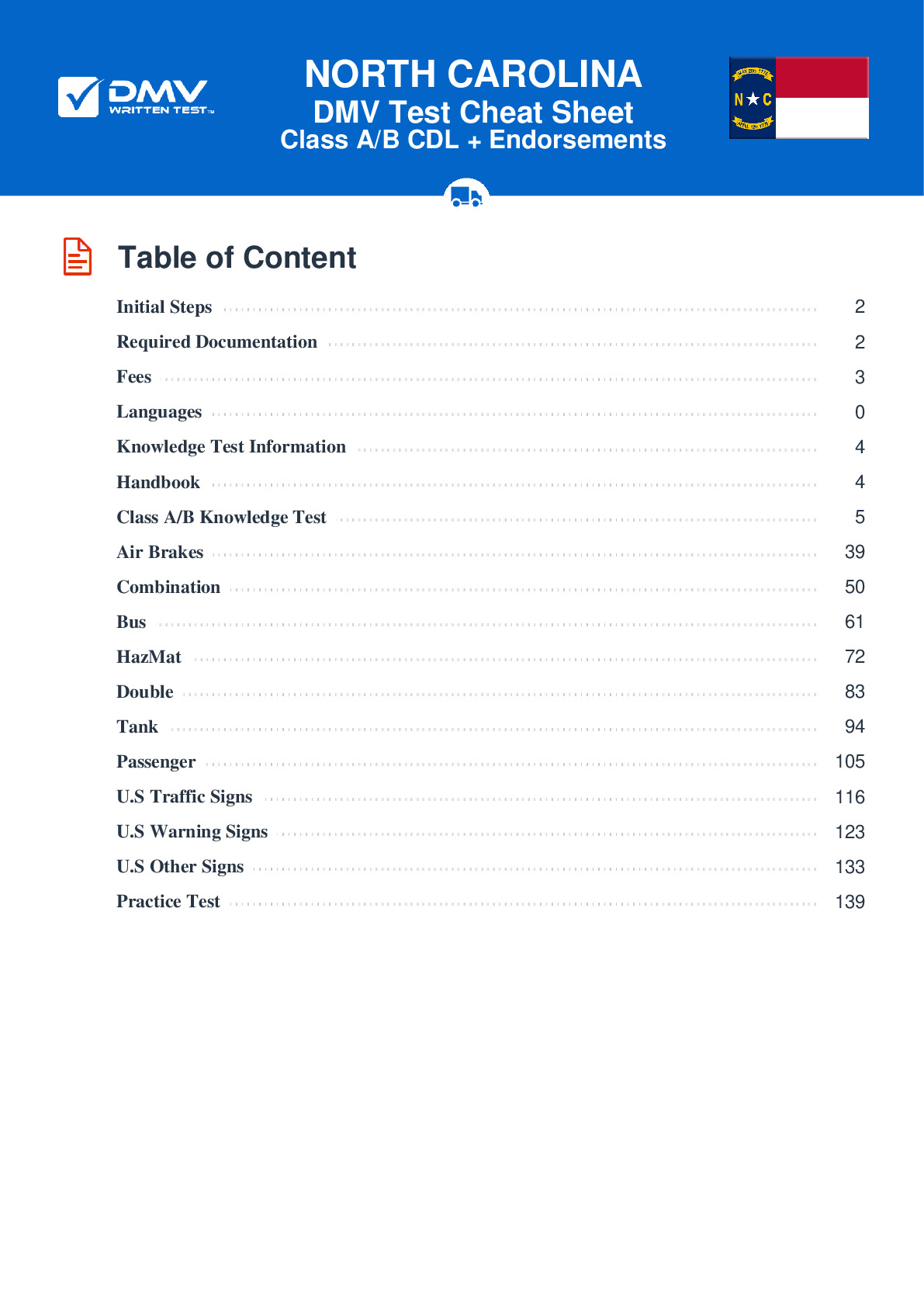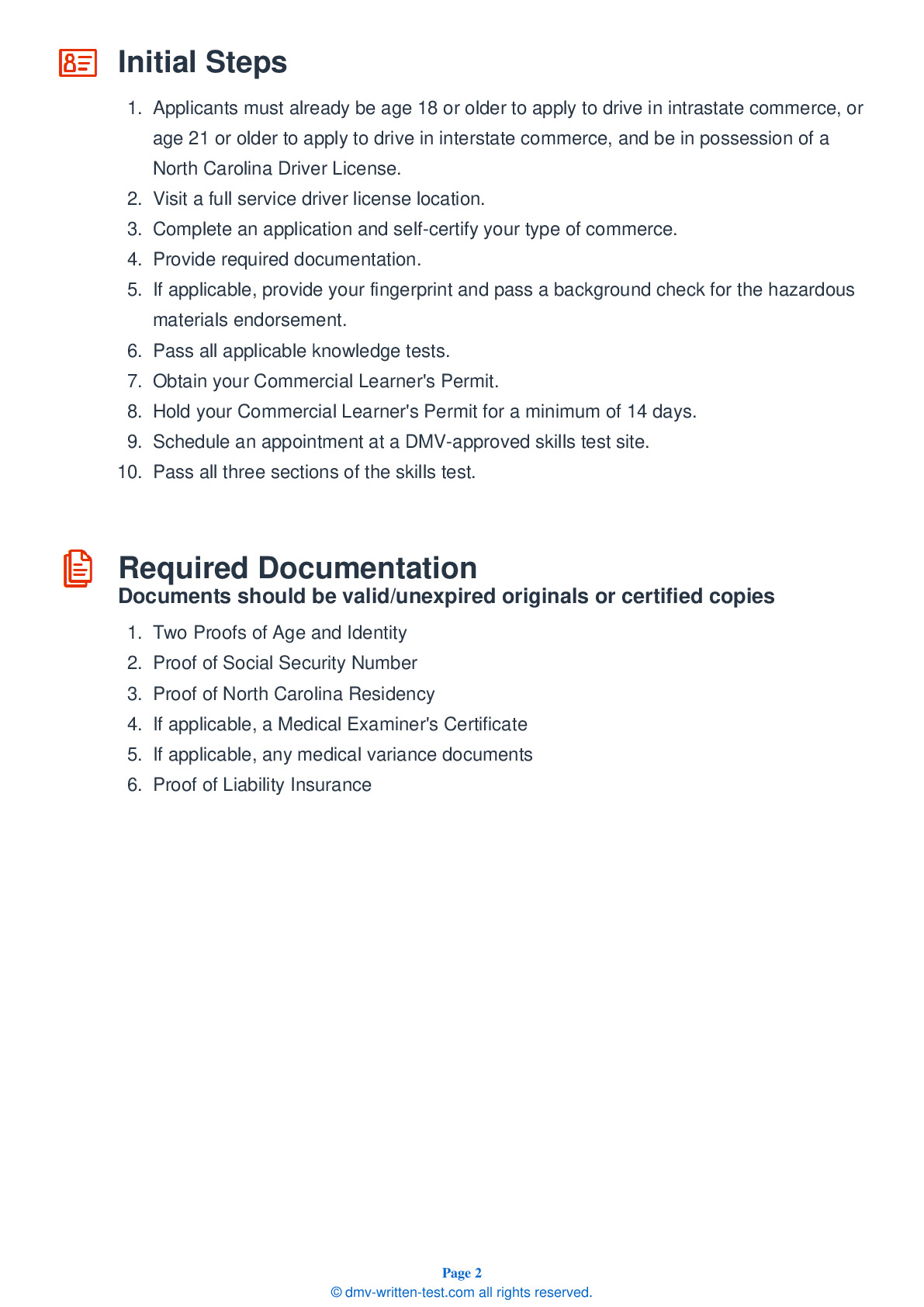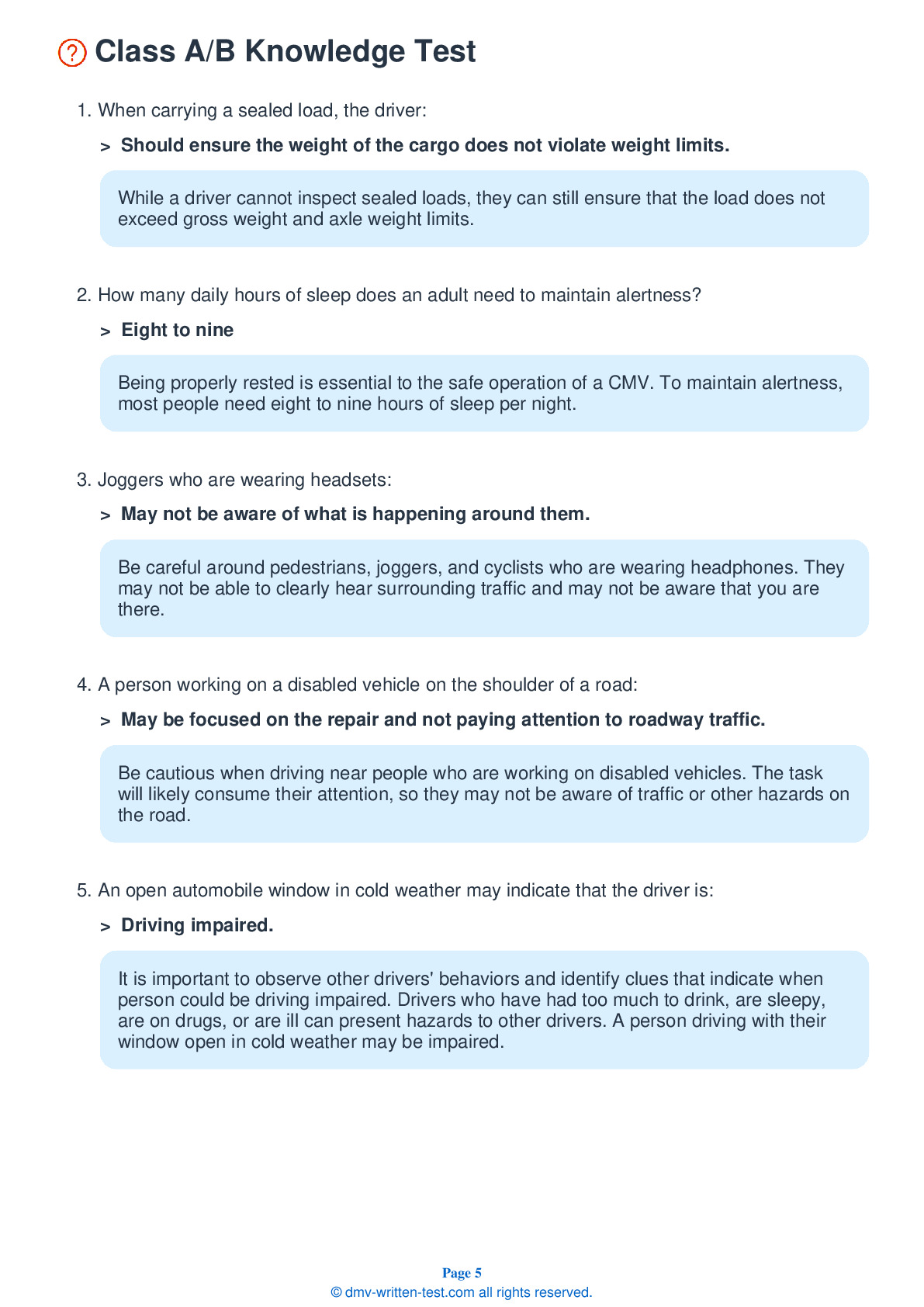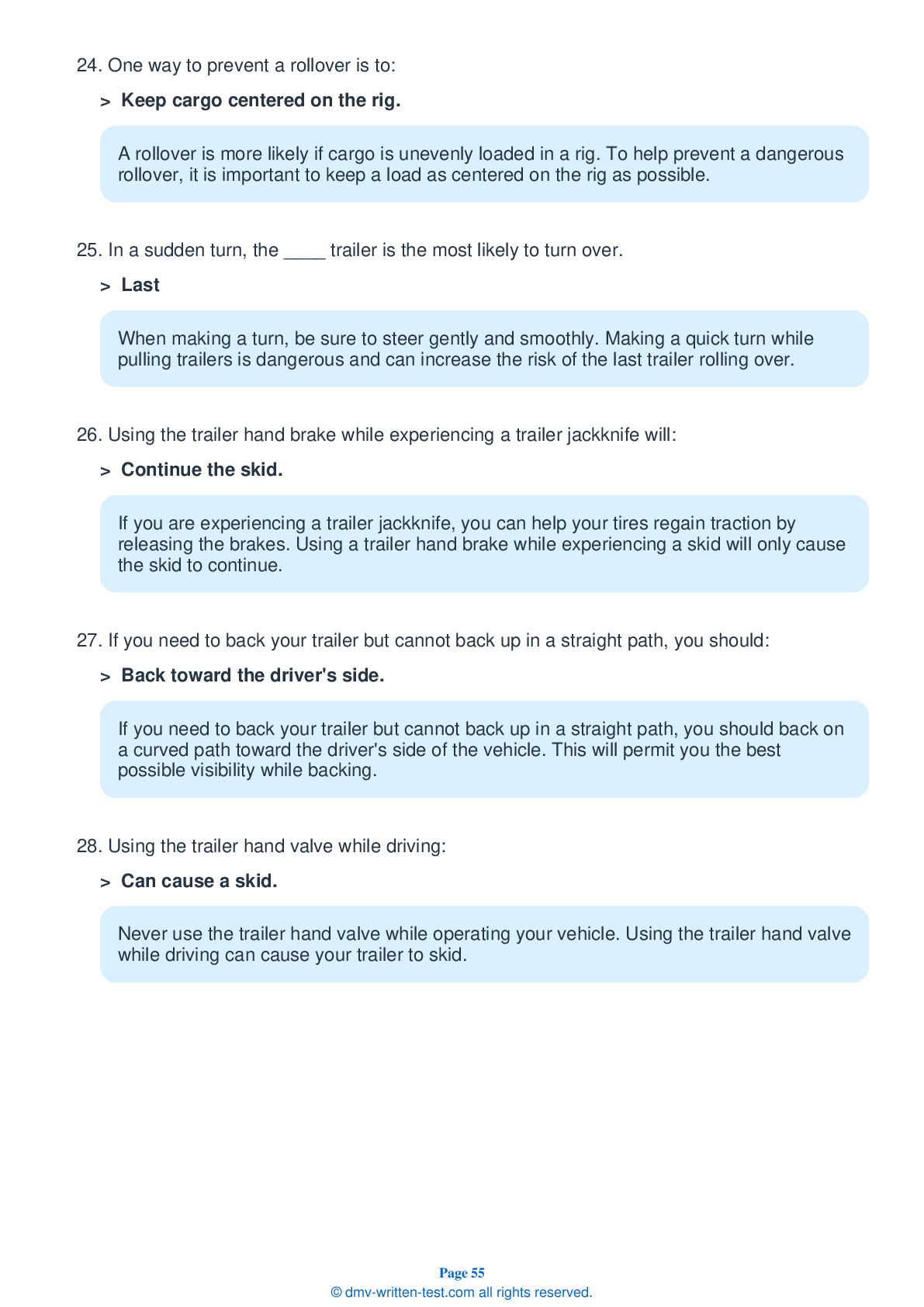Knowledge Test Class B
This license is required for driving a single vehicle with a GVWR of more than 26,001 pounds, and a trailer not to exceed 10,000 pounds gross vehicle weight rating, or a vehicle designed to transport 24 or more people (including the driver). To receive this license, applicants must pass a 50-question test. To pass, applicants must answer 40 questions correctly. Each question has three or four possible answer choices. Test questions come from the North Carolina Commercial Driver License Manual. Questions come from chapters covering: Introduction, Driving Safely, Transporting Cargo Safely, Air Brakes (if applicable), Pre-Trip Vehicle Inspection Test, Basic Vehicle Control Skills Test and On-Road Driving.. Endorsements that may be used with a Class B CDL are: Hazardous materials, Tank, Passenger, HazMat and Tank, Air Brakes and School bus.
22. Hydraulic brakes can fail for one of two reasons. Which of the following is one of those reasons?
Most hydraulic brake failures occur for one of two reasons. A first likely cause of brake failure is that the brakes have been overused on a downgrade, causing them to fade. The second likely cause is that there has been a loss of hydraulic pressure in the braking system. Brakes kept in good condition will rarely fail, but you should know which steps to take in case they do.
23. Which of the following may result in an applicant being denied a hazardous materials endorsement?
You will be denied a hazardous materials endorsement, or lose an existing endorsement, if you renounce your U.S. citizenship; are not a lawful permanent U.S. resident; are wanted for, indicted for, or convicted of certain felonies; are judged mentally defective or are committed to a mental institution; or are deemed by the Transportation Security Administration (TSA) to pose a security threat.
24. Dual tires should:
When inspecting a vehicle, you should verify that your dual tires do not come into contact with one another, or with any other part of the vehicle.
25. A distracted driver:
Driving while distracted may result in slowed perception, delayed decision-making, and improper actions. Watch for distracted drivers and avoid them, when possible.
26. If you need to travel down a hill, you should switch into a lower gear:
Always downshift before beginning to drive downhill. Forcing an automatic transmission into a lower gear at a high speed could damage the transmission and also lead to a loss of ability to engine brake. Drive at a speed that will allow you to control your vehicle without overusing your brakes. When determining a safe speed to drive, you should take into account the steepness of the grade, the length of the grade, the weight of your vehicle, road conditions, and weather conditions.
27. When traveling with cargo, you must make sure the cargo is secure:
Cargo should be inspected before beginning a trip, within the first 50 miles of the trip, and every three hours or 150 miles traveled. The driver of a truck transporting cargo is responsible for the cargo being safely secured throughout the trip.
28. Which of the following is not an example of a distracted person that motorists should be worried about?
Be cautious when driving near people who are not paying attention to the road. Be wary of road workers, drivers who are engaged in conversation with passengers, and children near the road.
Frequently Asked Questions
Here are the steps to obtain a Class B CDL license in North Carolina:
1. Obtain a North Carolina Commercial Driver's Manual from a DMV office or online.
2. Pass a DOT physical examination and obtain a Medical Examiner's Certificate.
3. Obtain a Commercial Learner's Permit (CLP) by passing the knowledge tests specific to the type of vehicle you intend to drive. You must hold the CLP for at least 14 days before taking the skills test.
4. Schedule and pass the skills test, which includes a pre-trip inspection, basic vehicle controls test, and road test. You will need to provide your own vehicle for the test.
5. If you pass the skills test, return to the DMV with your passing score sheet and pay the required fees to obtain your Class B CDL.
It is important to note that additional endorsements may be required for certain types of vehicles or cargo, such as hazardous materials or passenger transport.
- Straight trucks (e.g. dump trucks, tow trucks, delivery trucks)
- Large buses (e.g. school buses, city buses)
- Box trucks
- Flatbeds
- Dump trucks with small trailers
- Cement mixers
- Refrigerated trucks
It is important to note that certain types of vehicles or cargo may require additional endorsements on your CDL, such as hazardous materials or passenger transport. It is also important to follow all state and federal regulations regarding the operation of commercial vehicles.
1. Be at least 18 years of age.
2. Hold a valid non-commercial North Carolina driver's license.
3. Obtain a North Carolina Commercial Driver's Manual from a DMV office or online.
4. Pass a DOT physical examination and obtain a Medical Examiner's Certificate.
5. Obtain a Commercial Learner's Permit (CLP) by passing the knowledge tests specific to the type of vehicle you intend to drive. You must hold the CLP for at least 14 days before taking the skills test.
6. Provide proof of identity and residency in North Carolina.
7. Pass the skills test, which includes a pre-trip inspection, basic vehicle controls test, and road test. You will need to provide your own vehicle for the test.
8. If you pass the skills test, return to the DMV with your passing score sheet and pay the required fees to obtain your Class B CDL.
It is important to note that additional endorsements may be required for certain types of vehicles or cargo, such as hazardous materials or passenger transport. You will also need to maintain your CDL with regular medical exams and renewals as required by state and federal regulations.
1. Passenger Endorsement (P): Required for drivers who will be transporting 16 or more passengers, including the driver.
2. School Bus Endorsement (S): Required for drivers who will be operating a school bus.
3. Tank Vehicle Endorsement (N): Required if you plan to transport liquids or gases in bulk containers with a capacity of 119 gallons or more.
4. Hazardous Materials Endorsement (H): Required if you plan to transport hazardous materials as defined by federal regulations.
5. Combination Tank and Hazardous Materials Endorsement (X): Required if you plan to transport both hazardous materials and liquids or gases in bulk containers with a capacity of 119 gallons or more.
To obtain any of these endorsements, you must pass additional knowledge and skills tests specific to the endorsement. You must also meet any additional requirements, such as a background check and fingerprinting, for certain endorsements like Hazardous Materials Endorsement (H).
1. Pre-Trip Inspection: You will be asked to perform a thorough inspection of your vehicle, identifying any potential safety hazards or maintenance issues.
2. Basic Vehicle Control: You will be asked to demonstrate your ability to control the vehicle in various situations, including straight line backing, offset backing, and parallel parking.
3. On-Road Driving: You will be asked to drive on public roads, demonstrating your ability to safely operate the commercial vehicle in real-world conditions while following traffic laws and regulations.
The test may take several hours to complete and will be administered by a certified examiner. You must provide a vehicle that meets the requirements for the Class B CDL and bring all required documents, including your learner's permit, medical certificate, and proof of insurance. Be sure to practice and prepare for the test by reviewing the North Carolina Commercial Driver License Manual and taking any necessary training courses.
1. Vehicle Weight: You are only allowed to operate a single vehicle with a gross vehicle weight rating (GVWR) of 26,001 pounds or more.
2. Towing: You are not allowed to tow a trailer with a GVWR of 10,000 pounds or more, except for a trailer with a GVWR of less than 10,000 pounds that is used for agricultural purposes.
3. Passenger Transport: You are only allowed to transport up to 15 passengers, including the driver.
4. Hazardous Materials: You may be required to obtain a Hazardous Materials Endorsement (H) to transport certain types of hazardous materials.
5. Time Restrictions: You may be subject to federal and state regulations regarding driving hours and rest breaks.
It is important to understand and follow these restrictions and limitations as violating them can result in fines, license suspension, or even disqualification from driving commercially. Additionally, some employers may have additional requirements or restrictions for their drivers beyond what is mandated by law.
However, it's important to note that the skills test (pre-trip inspection, basic vehicle control, and on-road driving) will be conducted in English. Additionally, you will need to demonstrate that you can read and understand English by passing a written or oral English proficiency test.
If you need a language interpreter or translator for the skills test or for other DMV services, you may bring your own interpreter or use one of the DMV's approved language services providers. However, you will need to make arrangements for an interpreter or translator in advance and pay any associated fees.
It's important to check with your local DMV office for specific information on language options and requirements for obtaining a Class B CDL.
To request accommodations for the written test, you will need to complete and submit a Request for Accommodation form and provide documentation of your disability from a qualified healthcare professional. The form and documentation should be submitted to the DMV's Driver License Section at least 30 days before your scheduled appointment.
Examples of accommodations that may be provided include extended testing time, a separate testing area, a reader or scribe, or use of assistive technology. The DMV will work with you and your healthcare professional to determine appropriate accommodations based on your disability and individual needs.
It's important to note that the skills test (pre-trip inspection, basic vehicle control, and on-road driving) cannot be modified or waived due to a disability. However, you may still be able to obtain a Class B CDL with reasonable accommodations for the written test.
If you have any questions about requesting accommodations for the Class B CDL written test, you should contact your local DMV office for assistance.
In North Carolina, you must wait at least one business day before you can retake the written test. You may take the test up to three times in a row during a single office visit. If you fail the test three times, you will need to wait at least 30 days before you can take it again.
It's important to note that there is a fee for each attempt at the written test, so failing multiple times can be costly. Therefore, it's important to prepare adequately for the test by studying the North Carolina Commercial Driver's License Manual and taking practice tests.
If you have any questions about retaking the Class B CDL written test or need additional study resources, you should contact your local DMV office for assistance.




